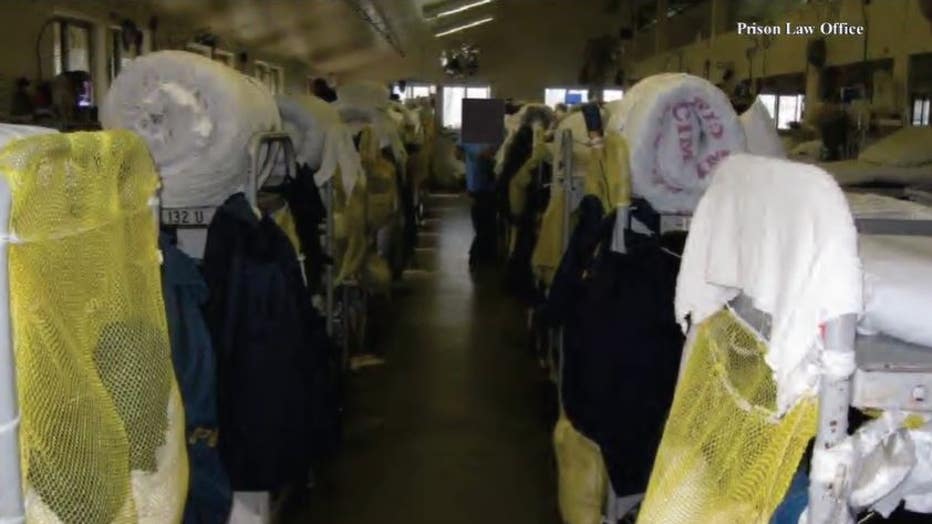Inmates: 'inhumane conditions' at California prison amid COVID-19

Inmates: ‘inhumane conditions’ at California prison amid COVID-19
After a mother heard from her incarcerated son that dozens of inmates were going without soap, sanitizer or masks at a California prison, she vowed to do something about it.
SAN QUENTIN, Calif. - After a mother heard from her incarcerated son that dozens of inmates were going without soap, sanitizer or masks at a California prison, she vowed to do something about it. After all, Lisa King has a fashion degree and considers sewing a passion and a stress reliever.
"This is so fulfilling for me and it's helping me get through this," she said as she sewed masks for inmates. "To be honest, I'm terrified. My son says they're not enforcing social distancing. People are dying."
She spoke about the questionable conditions inside and the outbreaks of coronavirus that are popping up at prisons across the country.
Inmates at San Quentin state prison sent letters and a lengthy petition to KTVU claiming “inhumane conditions” amid the coronavirus pandemic.
The letters and pages of several hundred signatures describe “grossly overpopulated” dorms with limited personal protective equipment, lack of sanitizer and soap, and “impossible” physical distancing.
“They’re fearful of what can happen,” King, whose son is housed at there said. “It’s very stressful for them.”
While there haven’t been any known cases there, state data shows more than 1,200 positive cases of COVID-19 and nine deaths reported among all California prison inmates. More than 230 guards and prison staff have also contracted the virus.
The largest outbreak is at the California Institution for Men (CIM) in Chino. All nine deaths are linked to that prison along with more than 630 positive cases.
“It’s senseless,” said Kate Chatfield with the Justice Collaborative. “They were completely foreseeable and preventable.”
Chatfield is a senior advisor for the advocacy group that fights for criminal justice reform aimed at incarcerating as few people as possible.
Photos obtained by KTVU and taken before the outbreak show the conditions inside, including close quarters, shared common spaces and bunks where inmates slept just a couple feet from one another.

Those pictures were submitted as evidence in an attempt by Prison Law Office, which advocates for inmates, to force the state to implement physical distancing and ultimately reduce prison populations during the pandemic.
“The fact of the matter is there are still hundreds of people still using the same toilet, the same sink,” Chatfield said. “There’s just too many bodies in cramped spaces.”
The California Department of Corrections and Rehabilitation responded to the increases of cases at CIM with temporary housing including bathrooms and showers. In total, 300 inmates have been moved from open-dorm settings.
Additionally, California has granted an early release to 3,500 inmates across the state, although all of them were within 60 days of parole. A spokeswoman said there are no plans to free anyone else.
California’s 35 prisons have long been overcrowded and currently house close to 109,000 inmates. That is roughly 24,000 over capacity.
The first spike in coronavirus cases came in April when the numbers tripled. Not long after the outbreak at CIM, a new cluster appeared at the California Institution for Women near Los Angeles. So far, more than 130 positive cases have been reported.
The state explained it's performing more COVID-19 tests, health screenings and providing inmates with five reusable masks. Additionally, institutions are conducting deep-cleaning of high traffic areas and communal areas like dayrooms, showers, restrooms and offices. The cleanings happen at least once every three hours, a spokeswoman said.
But at San Quentin, inmates claim that's not happening. King said it sparked her to quickly sew nearly 100 masks a day and send them off to California’s prisons.
“I would just plea to them that they can do more,” King said. “Even if someone made a mistake, they’re still a human being. They still need to be protected.”
Brooks Jarosz is an investigative reporter with KTVU. Email him at brooks.jarosz@foxtv.com or follow him on Twitter: @BrooksKTVU and Facebook.

